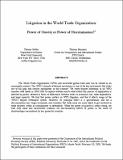|
Reseña:
|
The World Trade Organization (WTO) and associated global trade laws can be viewed as an incomplete contract. The WTO’s dispute settlement mechanism is one of the key instruments that states use to fill gaps and resolve ambiguities in this contract. We study dispute initiations in all WTO member state dyads in 1995-2003 to explore whether and to what extent this process of legalization is affected by power, defined in terms of differences between states in economic size, trade dependence, and legal capacity. We find that power matters in WTO litigation, and that it affects usage of the WTO’s dispute settlement system. However, its principal effect is gravitational, and not a discriminatory one: larger economies and countries that trade more are more likely to get involved in trade disputes, either as complainants or defendants. While the power of gravity is rather strong, we find only weak and inconsistent evidence for discriminatory effects of power in the sense of disadvantages encountered by less powerful countries. |

